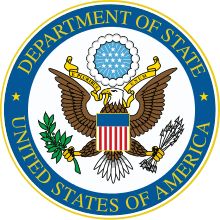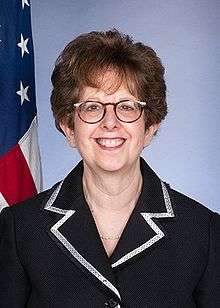United States Ambassador to Latvia
| Ambassador of the United States to Latvia | |
|---|---|
|
Seal of the United States Department of State | |
| Nominator | Barack Obama |
| Inaugural holder |
Frederick W.B. Coleman as Envoy Extraordinary and Minister Plenipotentiary |
| Formation | September 20, 1922 |
| Website | U.S. Embassy - Riga |
The United States first established diplomatic relations with the Baltic states (Latvia, Lithuania, Estonia) in 1922. One ambassador, resident in Riga, Latvia, was appointed to all three nations. Relations with the three nations were broken after the Soviet invasion of the republics in 1940 at the beginning of World War II. The United States never recognized the legitimacy of the Soviet occupation of the Baltic states, nor the legitimacy of the governments of those states under Soviet occupation. Hence, diplomatic relations were not resumed until 1992 after the collapse of the Soviet Union.
The U.S. Embassy in Latvia is located in Riga.
On Thursday, February 5, 2015, President Barack Obama nominated Nancy Bikoff Pettit, of Virginia, a Career Member of the Senior Foreign Service, Class of Counselor, to the U.S. Senate for confirmation to serve as Ambassador to Latvia.[1]
Ambassadors
U.S. diplomatic terms
After 1915, The United States Department of State began classifying ambassadors as career Foreign Service Officers (FSOs) for those who have served in the Foreign Service for a specified amount of time.
Political appointee
A person who is not a career foreign service officer, but is appointed by the president (often as a reward to political friends).
Appointed
The date that the ambassador took the oath of office; also known as “commissioning”. It follows confirmation of a presidential appointment by the Senate, or a Congressional-recess appointment by the president. In the case of a recess appointment, the ambassador requires subsequent confirmation by the Senate.
Presented credentials
The date that the ambassador presented his letter of credence to the head of state or appropriate authority of the receiving nation. At this time the ambassador officially becomes the representative of his country. This would normally occur a short time after the ambassador’s arrival on station. The host nation may reject the ambassador by not receiving the ambassador’s letter, but this occurs only rarely.
Terminated mission
Usually the date that the ambassador left the country. In some cases a letter of recall is presented, ending the ambassador’s commission, either as a means of diplomatic protest or because the diplomat is being reassigned elsewhere and replaced by another envoy.
Chargé d'affaires
The person in charge of the business of the embassy when there is no ambassador commissioned to the host country. See chargé d'affaires.
Ad interim
Latin phrase meaning "for the time being", "in the meantime". See ad interim.
- Name: Frederick W.B. Coleman[2] – Political appointee
- Title: Envoy Extraordinary and Minister Plenipotentiary
- Appointed: September 20, 1922
- Presented credentials: November 13, 1922
- Terminated mission: Left post October 20, 1931
- Name: Robert Peet Skinner[2][3] – Career FSO
- Title: Envoy Extraordinary and Minister Plenipotentiary
- Appointed: September 23, 1931
- Presented credentials: January 28, 1932
- Terminated mission: Left post April 29, 1933
- Name: John Van Antwerp MacMurray[2][4] – Career FSO
- Title: Envoy Extraordinary and Minister Plenipotentiary
- Appointed: August 28, 1933
- Presented credentials: December 13, 1933
- Terminated mission: Left post February 12, 1936
- Name: Arthur Bliss Lane[2] – Career FSO
- Title: Envoy Extraordinary and Minister Plenipotentiary
- Appointed: January 24, 1936
- Presented credentials: July 2, 1936
- Terminated mission: Left post September 16, 1937
- Name: Frederick A. Sterling[5][6] – Career FSO
- Title: Envoy Extraordinary and Minister Plenipotentiary
- Appointed: August 9, 1937
- Presented credentials: —
- Terminated mission: —
- Name: John C. Wiley[5][7] – Career FSO
- Title: Envoy Extraordinary and Minister Plenipotentiary
- Appointed: July 18, 1938
- Presented credentials: October 6, 1938
- Terminated mission: June 17, 1940
Note: Soviet forces occupied Riga on June 17, 1940, which effectively ended the U.S. diplomatic presence in those nations. Ambassador Wiley departed Riga on July 25, 1940.
Note: Earl L. Packer was serving as Chargé d'Affaires ad interim when all U.S. diplomatic officials were withdrawn and the legation in Riga was officially closed on September 5, 1940.
Note: The United States announced its readiness to reestablish relations with Latvia on September 2, 1991. Embassy Riga was established October 2, 1991 with Ints M. Silins as Chargé d'Affaires ad interim pending his appointment as ambassador.
- Name: Ints M. Silins – Career FSO
- Title: Ambassador Extraordinary and Plenipotentiary
- Appointed: March 23, 1992
- Presented credentials: April 10, 1992
- Terminated mission: Left post July 14, 1995
- Name: Larry C. Napper – Career FSO
- Title: Ambassador Extraordinary and Plenipotentiary
- Appointed: June 27, 1995
- Presented credentials: August 1, 1995
- Terminated mission: Left post October 1, 1998
- Name: James Howard Holmes – Career FSO
- Title: Ambassador Extraordinary and Plenipotentiary
- Appointed: August 4, 1998
- Presented credentials: August 27, 1998
- Terminated mission: Left post September 15, 2001
- Name: Brian E. Carlson – Career FSO
- Title: Ambassador Extraordinary and Plenipotentiary
- Appointed: November 5, 2001
- Presented credentials: December 4, 2001
- Terminated mission: Left post December 6, 2004
- Name: Catherine Todd Bailey – Political appointee
- Title: Ambassador Extraordinary and Plenipotentiary
- Appointed: November 29, 2004[8]
- Presented credentials: February 4, 2005
- Terminated mission: c. December 2007
- Name: Charles W. Larson, Jr. – Political appointee
- Title: Ambassador Extraordinary and Plenipotentiary
- Appointed: January 7, 2008
- Presented credentials: February 12, 2008
- Terminated mission: June 2009
- Name: Judith G. Garber – Career FSO
- Title: Ambassador Extraordinary and Plenipotentiary
- Appointed: August 14, 2009
- Presented credentials: August 25, 2009
- Terminated mission: July 9, 2012
- Name: Mark Pekala – Career FSO
- Title: Ambassador Extraordinary and Plenipotentiary
- Appointed: July 10, 2012
- Presented credentials: September 4, 2012
- Terminated mission: Left post August 7, 2014
- Name: Nancy Pettit – Career FSO
- Title: Ambassador Extraordinary and Plenipotentiary
- Appointed: July 29, 2015
- Presented credentials: September 8, 2015
- Terminated mission: Incumbent
Notes
- ↑ http://www.whitehouse.gov/the-press-office/2015/02/05/presidential-nominations-sent-senate
- 1 2 3 4 The ambassador was simultaneously accredited to Latvia, Lithuania, and Estonia, while resident in Riga, Latvia.
- ↑ Skinner was commissioned during a recess of the Senate and recommissioned after confirmation on December 17, 1931.
- ↑ MacMurray was commissioned during a recess of the Senate and recommissioned after confirmation on January 15, 1934.
- 1 2 The ambassador was simultaneously accredited to Estonia and Latvia, while resident in Riga.
- ↑ Sterling took the oath of office but did not proceed to post.
- ↑ Wiley was commissioned during a recess of the Senate and recommissioned after confirmation on Jan 20, 1939.
- ↑ An earlier nomination of September 8, 2004 was not acted upon by the Senate.
See also
References
- United States Department of State: Background notes on Latvia
 This article incorporates public domain material from the United States Department of State website http://www.state.gov/r/pa/ei/bgn/index.htm (Background Notes).
This article incorporates public domain material from the United States Department of State website http://www.state.gov/r/pa/ei/bgn/index.htm (Background Notes).
External links
- United States Department of State: Chiefs of Mission for Latvia
- United States Department of State: Latvia
- United States Embassy in Riga

